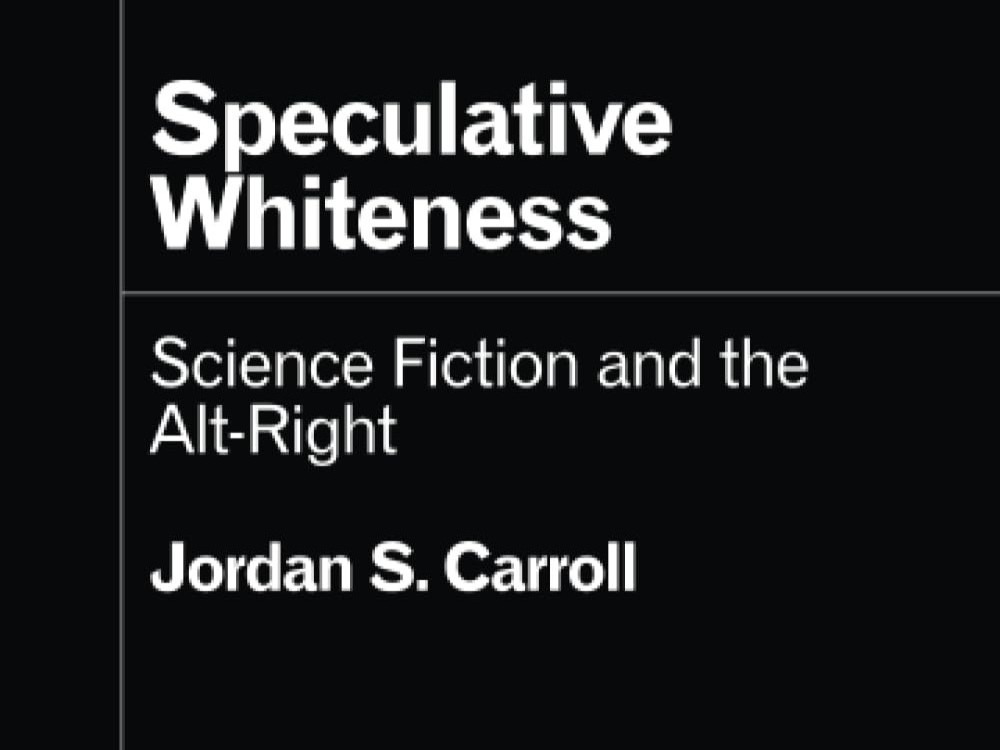Unpicking the relationship between science fiction and the alt-right

Speculative Whiteness: Science Fiction and the Alt-Right (University of Minnesota Press) by Jordan S. Carroll
Right-wingers are usually seen as political advocates for the past, associated with traditional values and hierarchies. Jordan S. Carroll’s Speculative Whiteness demolishes this assumption that the right always look backwards in a brisk 106 pages. His main focus is on the alt-right: a self-rebranded, mostly online movement which proliferated from around 2010 to 2017, when it mostly collapsed and was absorbed into other far-right movements. The alt-right, as Carroll shows, were obsessed with the future in general and with the science-fiction genre in particular. They didn’t just want to return to an era of patriarchy and white supremacy; many also wanted to use this blueprint to go further, creating a radically new society.
Figures like blogger and writer Theodore Beale and white nationalist activist Richard Spencer have expressed beliefs that the white race is innately expansionist and ambitious and that white people, and white people alone, have therefore driven all human progress. Building on the racist musings of past works – like Oswald Spengler’s sweeping book of white supremacist theory The Decline of the West (1937), which characterised Europeans as having the only culture still moving forward, or William Luther Pierce’s pulp dystopian The Turner Diaries (1978), in which white freedom fighters murder their Jewish overlords – alt-right figures argued that tomorrow is inherently white.
It was in this context that Beale, in 2013, infamously insulted Black science-fiction writer N.K. Jemisin, telling her that while his ancestors were “fully civilized”, Africans still were not. Only white people, he said, were “capable of building an advanced civilization”, and only white people could, therefore, create science fiction. Beale’s comments were despicable. But, Carroll is careful to point out, such racism is not new to science fiction.
On the contrary, speculative whiteness has deep roots in the genre. Novelists of the genre’s golden age in the 40s and 50s, such as Robert Heinlein and A.E. Van Vogt, trafficked in quasi-eugenic fantasies. These often involved hyper-evolved elites laying plans across the centuries to impose more or less benevolent oligarchies on the less prescient, less vigorous and virile masses.
Carroll also acknowledges that far-right tropes continue to permeate the genre. It’s not hard to think of examples of narratives like, say, Avengers: Endgame in which, as Carroll says, “militaristic supermen” crush “biologically inferior invaders”. Even works like Frank Herbert’s Dune, which are meant to evoke authoritarian speculative whiteness in order to refute it, have been embraced by fascists. Many see its hero Paul Atreides as a feudal European with the prophetic foresight and ruthlessness necessary to carve out a galactic empire.
Carroll thinks this is a misreading of Dune. He also argues that the alt-right imagination makes for bad science fiction, because these thinkers aren’t actually interested in envisioning new futures. “Speculative whiteness will always remain self-imprisoned in a racist solipsism that prevents it from imagining anything outside or after itself,” he says. In contrast, he argues, the best science fiction – like Star Trek, or Jemisin’s Broken Earth series, which chronicles the revolt of an enslaved people who can cause earthquakes – seeks to think itself into new worlds and freedoms.
I share Carroll’s preference for science fiction that is not disgustingly bigoted. But given the connections he draws between classic science fiction and alt-right racism, I think his effort to marginalise speculative whiteness as a betrayal of the genre may be too easy. Is the alt-right really misreading Herbert’s Dune, for example? Or is Herbert perhaps ambivalently but powerfully invested in the very racist tropes he’s trying to reject? It’s not always so easy to write yourself out of the racist past. The struggle over what will be is always a struggle over what is now, and vice versa.
Carroll’s book is valuable as part of that struggle. Speculative Whiteness provides a chilling analysis of what the worst people want to do to us, now and tomorrow. Armed with that knowledge, we can, perhaps, chart a path to different and better stars.
This article is from New Humanist’s Summer 2025 issue. Subscribe now.

